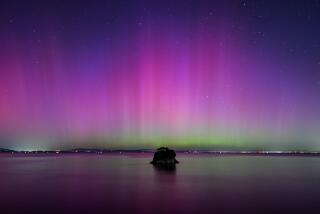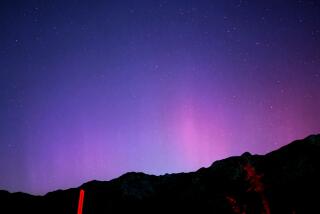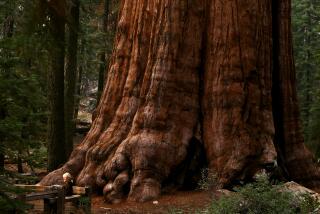Dark, star-filled skies draw visitors to national parks, survey finds
- Share via
What do you look for in a vacation -- rest and relaxation? Gorgeous vistas? Cultural experiences? How about a view of the cosmos?
A new study suggests that gazing upon a naturally dark sky that is unpolluted by artificial light plays a significant role in visitors’ enjoyment of national parks.
“There is a growing consciousness in the U.S. about the disappearance of naturally dark skies that’s kind of paradoxical,” said Bob Manning, who runs the Park Studies Laboratory at the University of Vermont. “It’s one of those things that we start to notice only when it begins to disappear.”
Scientists estimate that 99% of the planet’s skies are light polluted and that as of 15 years ago, two-thirds of Americans could no longer see the Milky Way from their backyards.
For many Americans, the opportunity to see the night sky glittering with the full cast of stars our ancestors once observed has become a reason in itself to visit a national park, and the National Park Service has taken notice. For the last decade its Natural Sounds and Night Sky Division has worked to manage both acoustical and dark night sky environments throughout the National Park System.
“Night skies is a good example of where progress is being made and a lot more progress can be made,” Manning said. “Unlike a lot of other environmental problems, light pollution is reversible.”
Within the park, managers can replace older lighting fixtures that allow light to “leak” into the atmosphere with those that focus light down on an intended target, for example. Keeping artificial light from surrounding areas out of the park may be more challenging, but it is not impossible, Manning said.
“The [parks service] doesn’t have absolute control over what is going on outside the park, but it can exert a lot of influence,” he said. “Especially if there is tourism associated with night skies.”
To help parks service workers communicate the draw of naturally dark skies to nearby communities, Manning’s group conducted two surveys at Acadia National Park in Maine. The first was designed to quantify how important a clear view of the stars is to park visitors. The second looked at what point the level of light pollution in a park would be considered unacceptable by most visitors.
The results of the two surveys were published Friday in the journal Park Science.
Nearly all of the hundreds of groups surveyed agreed very strongly that seeing the night sky on their visit to Acadia was important to them, and said they recognized the park as a good place to see the night sky.
The researchers also found that when people reported seeing natural light sources like the moon, stars, constellations and the Milky Way, it improved their experience of the park. Seeing man-made light sources like headlights, street lights and light from nearby cities had a negative effect on their experience of the park.
In another survey, participants were shown a poster depicting eight different views of the night sky in Acadia National Park with varying amounts of light pollution. In the most pristine, naturally dark sky the Milky Way is clearly visible. In the most light-polluted version, only a moon and a few of the brightest stars could be seen.
It was somewhere around the sixth-most light polluted picture, where the Milky Way is only barely visible, that people began to consider the dulled sky to be unacceptable.
“This research validates what our assumptions might be, and helps when the park service goes to work with town leaders,” Manning said. “Empirical evidence like this is important. It carries some weight.”
Manning’s previous work has looked at how hearing the sounds of nature, rather than the roar of cars, affects people’s experience of national parks.
“Generally what we find is that visitors to parks feel the ability to hear the sounds of nature and the ability to enjoy a dark sky rank up there in importance with conventional park resources,” he said. “I think visitors are becoming much more attuned to natural quiet and natural darkness.”
Science rules! Follow me @DeborahNetburn and “like” Los Angeles Times Science & Health on Facebook.







